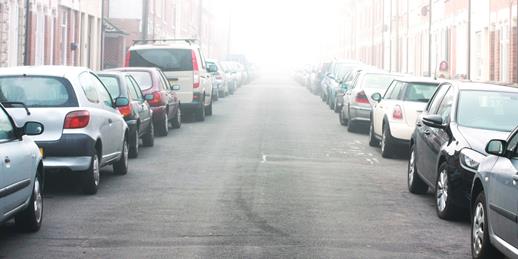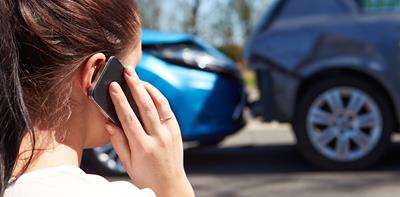
Yes, car insurance is mandatory. The police could give you a fixed penalty of £300 and six penalty points if you’re caught driving without insurance, while if the case goes to court you could get an unlimited fine and be disqualified from driving.
The police can seize, and in some cases, destroy a vehicle that’s being driven without insurance.
And let’s not forget, if someone is seriously injured or killed in an incident involving your car, insurance becomes more important than simply covering bent metal.
What’s the difference between comprehensive insurance and third party, fire and theft?
As the name suggests, comprehensive cover insures you against more eventualities. Third-party insurance simply covers the damage to other vehicles involved in an incident with your vehicle - you’ll have to cover the cost of damage to your own motor yourself. A Third-party, fire and theft policy covers you for damage to other vehicles and for your vehicle being stolen or damaged in a fire.
A comprehensive policy may offer you more peace of mind, as you can claim for repairs to your own vehicle in an incident, even if it was your fault.
Will my policy cover me to drive someone else’s car?
Your car insurance policy may be comprehensive, but that doesn’t mean you’ll have the right to drive a friend’s car. You’ll need to specifically ask for this to be added to your policy from the outset, and will likely have to pay more as a result.
Can someone else drive my car?
Unless they are a named driver on your policy, the other person will need to have car insurance cover that allows them to drive someone else’s vehicle.
I’ve got points on my licence; will that increase my insurance premium?
Yes, it will. If you receive the points midway through a policy term, then you should contact your insurer as you may need to rearrange your policy.
Can I spread my insurance payments?
Generally, you have two options when it comes to paying for your insurance: all up-front or in monthly stages. Be warned that with the latter option you may be charged interest, as you would with other services, so it could end up costing you more overall.
What is an insurance group?
Cars are placed into different groups by insurers, essentially as a means of working out how expensive they will be to repair if something goes wrong or they are in an accident. Cars in the lower numbered groups are generally less expensive to insure.
How can I find out which group my vehicle is in?
The Group Rating Panel determines which groups different vehicles are placed into. The panel is run by Thatcham Research, and you can search for which group your own vehicle is in on the Thatcham website.
I’ve moved house; do I need to tell my insurer?
Yes, your insurer needs to have up to date details about you and your car. Things like where you live will play a part in the pricing of your policy, and failing to notify your insurer could invalidate your policy.
Similarly, you should tell your insurer if you change jobs, have modifications added to the car or have points added to your licence.
Do I have a no-claims bonus?
For each year in which you don’t make a claim on your car insurance, you earn a year’s no-claims bonus. This then translates into cheaper premiums on your policy. No-claims bonuses differ from insurer to insurer. You can check what bonus you have on your latest renewal notice, or call your current insurer.
Can I protect my no-claims bonus?
Some insurers offer protected no-claims discount policies. In effect, this means that you can make a certain number of claims, over a specified period of time, and you will still enjoy the bonus and therefore the discounted premiums in future years of driving.
What is legal assistance?
Legal assistance is an added benefit which you can add onto your insurance policy, which will help meet your legal costs if you need to bring a claim or defend yourself against a claim following a car accident.
Will my policy cover me if I’m driving abroad?
Insurers will generally extend your cover if you’re driving in the EU, though the exact level of coverage on offer will vary between them.
Can I add extra drivers to the policy?
Yes, additional drivers can be added to your car insurance policy, but check the specifics with your insurer as there may be a cost to add someone to the policy mid-term.
Does it matter where I park my car at night?
If your car is parked somewhere secure at night, such as a garage, then there is generally less chance of it being broken into or damaged. That means there is less chance of you needing to make a claim on your policy.
Any steps that you can take to improve the safety of your car, such as fitting steering locks or an alarm, may help reduce the size of your premium.
Can I get a courtesy car if needed?
Some comprehensive policies offer this but it isn’t always standard so check your policy document to see what you are and aren’t covered for.
Can I get repairs at a garage of my own choosing?
Check with your insurer. Repairs will need to be authorised before any work to your car can begin.
What is fronting?
Fronting is when an experienced driver is named as the primary driver of a vehicle, with a less experienced or higher risk motorist added as a named driver, even though it is the latter who will be the main user of the car.
This can reduce the size of the premium, but is actually a form of fraud and can lead to the policy being invalidated or legal action.
Will I still get a payout if I’m hit by an uninsured driver?
If you have a comprehensive policy, your insurance will cover the cost of repairs no matter whether the other driver is insured or not, although you may still have to pay your excess.


